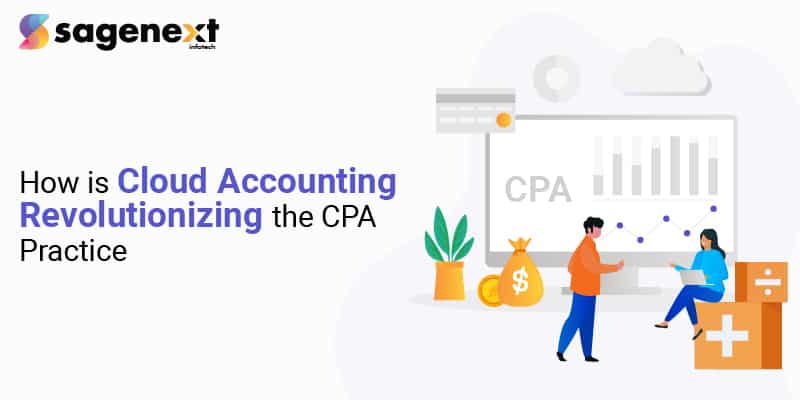
How is Cloud Accounting Revolutionizing the CPA Practice?
The cloud has been one of the flag bearers of the modern information technology revolution. It has emerged as one of the most effective IT solutions, helping businesses operate smoothly, flexibly, and with greater agility. It gives organizations on-the-go access to all their information and computing resources which helps them function efficiently, even amidst difficult situations like that of the COVID-19.

“The cloud is the mask protecting industries against the novel coronavirus.”
The cloud has revolutionized how businesses deliver their services and how they interact with their customers. It is the reason why most of the industries are moving to the cloud quickly. Industries like accounting and finance, which were apparently apprehensive about the cloud previously, are embracing it with open arms today. Cloud accounting is becoming rapidly popular while the accounting firms are rightly investing in cloud-based accounting applications such as QuickBooks.
What is Cloud Accounting?
Cloud accounting is a present-day accounting practice wherein all the accounting resources including data and applications are made available over the cloud. It eliminates all the physical barriers from accounting, enabling accountants and accounting firms to get access to all their accounting information and tools, whenever and wherever required. In cloud accounting all the on-premise, hardware-based accounting software have been replaced by sophisticated, cloud-hosted applications that are accessible through any device having a connection to the internet.
The concept of cloud accounting has revolutionized the CPA practice by bringing in all the benefits of the cloud into the accounting and finance industry.
The following are the top 10 reasons why cloud accounting is promising and beneficial for the CPAs:
1) The Flexibility of On-demand Access
With the increasing penetration of the internet, smartphone, and tablet PCs, combined with the on-demand cloud access, it becomes extremely flexible for the CPAs to work even from a remote location. They have access to all their data and accounting tools on the go. It enables them to work from any geographical location. This is the kind of flexibility that cloud accounting provides; One that was unheard of before the advent of the cloud.

2) Live Data
An accounting department doesn’t have to wait for the other departments to finish the paperwork, in order to access the information. Today, the information on cash flow, tax statements, earnings, and invoices etcetera can be shared simultaneously, giving live data access to all the departments. It not only saves a lot of time but also brings in great transparency in work. It also becomes easier for the decision-makers to take timely, accurate decisions based on real-time, error-free company data.

3) Scalability
In the current, global competitive setup, it is extremely important for an accounting firm to quickly scale up or down its server resources to meet its business needs. The cloud has made it possible for the accounting firms and CPAs to modify their resources, as and when required, without having to replace their hardware resources. Hence, cloud accounting provides far more convenient and cost-effective scalability options to the accounting firms.

4) Enhanced Cost-efficiency
Cloud accounting offers great cost-efficiency to an organization. The cloud storage and cloud-based accounting applications are inexpensive compared to the hardware server and in-house, computer-based software. The cloud accounting also removes the unnecessary costs of hardware maintenance, software updates, server inspection, etcetera. It helps organizations save a great deal of capital, as it is the cloud service provider’s responsibility to take care of all these tasks.

Moreover, an accounting firm has the liberty to choose a cloud subscription that best fits its business requirements. The pay-as-you-go method enables CPAs to pay only for the cloud resources being used and not for the entire cloud.
5) Improved Data Security
Sensitive accounting information and transactions need protection as well as regular inspection against potential security threats. The cloud offers great security measures that ensure the integrity and protection of important client data in addition to identifying security vulnerabilities.

Cloud accounting incorporates the following security strategies that help CPAs safeguard their data:
- Multi-factor authentication
- Data encryption
- Strong internal firewalls
- Robust login management system and password protection
6) Modern Data Backup Strategies
Cloud accounting enables CPAs to focus on critical tasks, worrying least about the data backup strategies. The cloud offers frequent, automatic backups that help accountants and CPAs easily recover their data, in case of any data loss. The cloud data backup ensures the critical, accounting data is available in catastrophic events like that of a natural calamity or a cyberattack.

The following are the cloud data backup options available to the CPAs:
- Direct backup to the public cloud
- Cloud-to-cloud backup
- Backup as a Service (BaaS)
- Online backup devices
7) Easy Integration and Collaboration
Technologies like Artificial Intelligence and Machine Learning are proving to be disruptive, bringing in great efficiency into businesses. They help automate data-intensive, laborious tasks, saving huge amounts of time and effort. Cloud accounting makes it easier and more convenient for the CPAs to integrate with these latest, sophisticated technologies.

The customized APIs (Application Programming Interfaces) of the cloud enables the CPAs and accounting firms to collaborate with their business partners or accounting tools and programs that are beneficial for them.
8) Automatic Updates
Cloud accounting software and resources are updated frequently, bringing in advanced IT features into accounting. These updates are installed automatically and ensure zero downtime. The CPAs can also turn the updates off, in case they wish to continue with the previous versions.

9) Environment-friendly Approach
Using cloud accounting and cloud-based resources helps CPAs reduce their carbon footprints, contributing to an environment-friendly business ecosystem. It is beneficial for them as well, as they have less hardware and hence, fewer power requirements to deal with. It also helps them get rid of a huge pile of papers and physical datasheets. Thus cloud accounting is an energy-efficient way of doing business, wherein CPAs and accounting firms have options to choose a green data center in which the cloud service provider incorporates environment-friendly practices.

10) Error and Duplicity Checks
Manual accounting involves huge amounts of data and numbers which makes it error-prone. With the cloud accounting tools and applications, the chances of these errors and repetitive entries become almost zero. Cloud accounting automatically identifies errors and rectifies them, and hence, helps CPAs keep their financial records error-free.

Cloud accounting, with all the aforementioned benefits, is immensely advantageous to CPAs and accounting firms. The ease of scalability, cost-effectiveness, data security, and accuracy it offers, makes it one of the most fascinating and revolutionary technologies for the accounting industry. The cloud and cloud-based programs promise to continue being more beneficial and profiting for the CPAs, and hence, will continue to attract significant investments in the future.
Given the pandemic situation and urgency for flexible, working-from-home work culture, cloud accounting is here to stay and flourish. It is a revolutionary, future-proof practice, helping CPAs enjoy great benefits.






